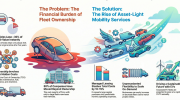Jetour, стремительно развивающийся игрок на автомобильном рынке, производит фурор своей линейкой внедорожников и кроссоверов, сочетающих стиль, функциональность и доступность. Однако, несмотря на элегантный дизайн и передовые характеристики, возникает ключевой вопрос: кто производит двигатели для этих автомобилей? В этой статье мы подробно рассмотрим происхождение двигателей Jetour, производителей, участвующих в их производстве, и то, как это повлияет на будущее бренда.
Бренд Jetour: краткий обзор
Jetour, основанная в 2018 году, является дочерней компанией Changan Automobile, одного из крупнейших автопроизводителей Китая. Ориентируясь на современного потребителя, предлагая сочетание технологий и дизайна, Jetour быстро занял свою нишу на высококонкурентном рынке внедорожников. В таких моделях, как Jetour X70 и X90, бренд делает акцент на просторных салонах, передовых технологиях и высокой производительности.
Производство двигателей: обзор
Двигатели — сердце любого автомобиля, и Jetour не исключение. Компания сочетает собственные разработки с партнёрством с проверенными производителями двигателей. Этот двойной подход не только повышает производительность, но и гарантирует соответствие двигателей строгим стандартам выбросов и эффективности, установленным регулирующими органами.
Собственная разработка двигателя
Компания Jetour вложила значительные средства в собственные исследования и разработки. Компания гордится своей преданной своему делу командой инженеров, сосредоточенной на создании двигателей, соответствующих духу бренда. Благодаря собственным разработкам Jetour интегрирует новейшие технологии, такие как турбонаддув и гибридные системы, что позволяет создавать двигатели, обеспечивающие высокую производительность и экономичность.
Партнерские отношения с проверенными производителями
Помимо собственного производства двигателей, Jetour сотрудничает с несколькими известными производителями. Это партнёрство позволяет использовать опыт и технологии ведущих игроков автомобильной отрасли, гарантируя, что автомобили Jetour будут оснащены надёжными и эффективными силовыми агрегатами. Среди наиболее значимых партнёрств:
- Changan Automobile: Будучи дочерней компанией, Jetour использует богатый опыт Changan в производстве двигателей. Обе компании сотрудничают в области разработки и технологий двигателей, гарантируя, что автомобили Jetour будут обладать передовыми возможностями.
- Ford: Jetour также изучает возможности сотрудничества с международными компаниями, такими как Ford. Используя технологию двигателей Ford EcoBoost, Jetour повышает производительность и эффективность своих автомобилей, опираясь на многолетний опыт инженерного мастерства.
Типы двигателей, используемых в моделях Jetour
Jetour предлагает широкий выбор двигателей для своей линейки автомобилей, отвечающих самым разным предпочтениям покупателей. В число двигателей, обычно устанавливаемых на модели Jetour, входят:
- 1,5-литровый турбированный двигатель: этот двигатель обычно устанавливается на Jetour X70 и обеспечивает баланс мощности и эффективности. Он обеспечивает динамичное вождение при конкурентоспособной топливной экономичности.
- Двигатель 2,0 л с турбонаддувом: устанавливается в более крупных моделях, таких как Jetour X90, и обеспечивает улучшенные характеристики, что делает его подходящим для тех, кто ищет более мощные ощущения от вождения без ущерба для эффективности.
- Гибридные варианты: В то время как автомобильная промышленность стремится к устойчивому развитию, Jetour изучает варианты гибридных двигателей. Эти двигатели представляют собой экологичную альтернативу, сохраняя при этом первостепенное значение производительности.
Будущее двигателей Jetour
По мере того, как Jetour продолжает расширять своё присутствие на рынке, будущее производства двигателей выглядит многообещающим. С ростом инвестиций в электрические и гибридные технологии Jetour готов к дальнейшим инновациям, следуя мировым тенденциям в области устойчивой мобильности. Бренд стремится расширить линейку двигателей, уделяя особое внимание эффективности, производительности и снижению воздействия на окружающую среду.
Глядя на горизонт инженерных возможностей Jetour, становится очевидно, что бренд не почивает на лаврах. Автомобильная промышленность переживает радикальные перемены: электрификация и устойчивое развитие выходят на первый план. Jetour прекрасно понимает эту тенденцию и активно инвестирует в исследования и разработки, чтобы создавать не только мощные, но и экологичные двигатели.
Принятие электрификации
В условиях ужесточения норм выбросов и глобального стремления к более экологичным технологиям Jetour изучает возможности электрических и гибридных силовых установок. Компания стремится выпустить линейку электромобилей (ЭМ), ориентированных на потребителей, заботящихся об окружающей среде. Этот переход отражает общую тенденцию к электрификации в отрасли, где производители всё больше внимания уделяют сокращению своего углеродного следа.
Приверженность Jetour разработке электромобилей — это не просто ответ на требования рынка; это стратегический поворотный момент, позиционирующий бренд как дальновидного игрока в автомобильном секторе. Благодаря планам по внедрению передовых технологий аккумуляторных батарей, Jetour стремится увеличить запас хода и эффективность своих электромобилей, тем самым конкурируя с признанными производителями электромобилей.
Передовые технологии в проектировании двигателей
В будущем двигатели Jetour будут оснащены передовыми технологиями, такими как искусственный интеллект (ИИ) и машинное обучение. Эти технологии позволяют оптимизировать производительность двигателя и топливную экономичность, анализируя особенности вождения и условия окружающей среды. Используя ИИ, Jetour сможет создавать интеллектуальные двигатели, адаптирующиеся к различным сценариям вождения, обеспечивая непревзойденный опыт вождения.
Кроме того, Jetour изучает возможность использования облегченных материалов и инновационных методов проектирования для повышения производительности двигателя. Такой акцент на эффективности не только улучшит разгон и управляемость, но и будет способствовать снижению расхода топлива, отвечая ожиданиям потребителей в отношении производительности без ущерба для экологичности.
Глобальное сотрудничество для расширения возможностей
В своём стремлении к инновациям Jetour не боится формировать стратегические альянсы с мировыми автомобильными гигантами. Сотрудничество с известными технологическими компаниями обеспечивает Jetour доступ к новейшим достижениям в области двигателестроения и производственных процессов. Объединяя ресурсы и опыт, Jetour может ускорить свои НИОКР и быстрее выводить на рынок передовые двигатели.
Эти партнерства также позволят Jetour получить доступ к обширным знаниям в области соблюдения нормативных требований и стандартов безопасности, гарантируя, что ее двигатели соответствуют мировым ожиданиям или превосходят их.
Подход, ориентированный на потребителя
По мере развития Jetour ориентация на потребности потребителей останется приоритетной задачей стратегии компании. Бренд стремится взаимодействовать со своей клиентской базой, чтобы понимать их предпочтения и ожидания в отношении производительности и эффективности двигателей. Этот подход, ориентированный на потребителя, позволит Jetour разрабатывать двигатели, которые не только соответствуют эталонным характеристикам, но и отражают ценности целевой аудитории.
Отдавая приоритет отзывам клиентов, Jetour может гарантировать, что ее инновации соответствуют требованиям рынка, что еще больше укрепляет ее позиции как конкурентоспособного игрока в автомобильной промышленности.
Jetour готовится к будущему, сохраняя неизменной приверженность инновациям и производительности. Автомобильный рынок стремительно развивается, а вместе с ним и требования к технологиям двигателей. Jetour готов идти в этом направлении, сочетая амбиции и гибкость, гарантируя, что его двигатели не только отвечают требованиям сегодняшнего дня, но и предвосхищают потребности завтрашнего дня.
Фокус на исследованиях и разработках
В основе стратегии Jetour лежат активные инвестиции в исследования и разработки (НИОКР). Компания понимает, что для сохранения конкурентоспособности необходимо постоянно внедрять инновации. Это подразумевает не только совершенствование существующих конструкций двигателей, но и исследование революционных технологий, таких как водородные топливные элементы и передовые аккумуляторные системы. Развивая культуру инноваций, Jetour стремится оставаться лидером и укреплять свои позиции на мировой автомобильной арене.
Привлечение потребителей и обратная связь
Подход Jetour к разработке двигателей основан на отзывах потребителей. Бренд активно взаимодействует со своими клиентами, собирая информацию об их опыте вождения и ожиданиях. Эта ценная информация используется в процессе разработки, позволяя Jetour адаптировать двигатели к предпочтениям и потребностям своей аудитории. Jetour стремится обеспечить оптимальные впечатления от вождения, будь то повышение топливной экономичности, увеличение мощности или обеспечение более тихой работы.
Адаптация к глобальным тенденциям
Следя за мировыми тенденциями, Jetour также готовится удовлетворить растущий спрос на экологичные автомобили. Переход на электрификацию — это не просто тенденция, это необходимость. Стратегия Jetour включает разработку ряда гибридных и полностью электрических моделей, которые понравятся потребителям, заботящимся об экологии. Компания изучает возможности сотрудничества с производителями аккумуляторов и технологическими компаниями для расширения своих возможностей в этой области, гарантируя своим электромобилям впечатляющий запас хода и быструю зарядку.
Приверженность качеству и безопасности
Помимо производительности и инноваций, Jetour уделяет особое внимание качеству и безопасности. Компания строго контролирует качество на протяжении всего процесса производства двигателей. Это стремление к совершенству гарантирует, что каждый произведенный двигатель соответствует высочайшим стандартам надежности и безопасности, обеспечивая водителям спокойствие.
Видение будущего
Заглядывая в будущее, Jetour видит будущее, в котором его двигатели не только приводят в движение автомобили, но и вносят вклад в устойчивое развитие мира. Бренд полон решимости стать лидером в разработке двигателей нового поколения, уделяя первостепенное внимание эффективности, производительности и экологической ответственности. Ориентируясь на инновации, отзывы потребителей и мировые тенденции, Jetour готов занять значительную нишу на конкурентном автомобильном рынке.

